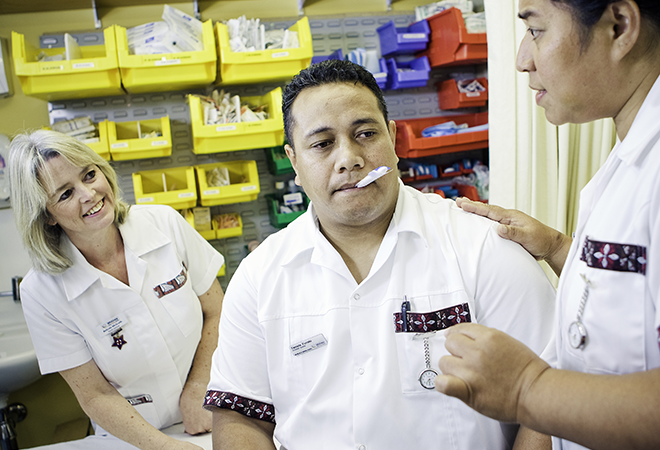
Evaluating the quality of workplace learning for nursing students in community settings
Status
Completed: 1 December 2010
Project Details
A project, completed in 2010, to test the validity and reliability of the Clinical Learning Environment, Supervision, and Nurse Teacher (CLES+T) scale as a tool for assessing students' perception of the quality of their learning in community settings. A collaboration of Christchurch Polytechnic Institute of Technology and Turku University of Applied Sciences, Turku, Finland.
Aims
The main aims of the project were to:
- establish the factor structure of the CLES+T when applied in community clinical settings in New Zealand
- evaluate the internal reliability of the CLES+T factors in the context of community clinical settings in New Zealand
- establish whether the CLES+T has the same factor structure when applied in community clinical settings in New Zealand as it does in New Zealand and Finnish hospital settings
- describe nursing students’ perceptions of the quality of their clinical learning experiences in community clinical settings in New Zealand.
Methodology
The project methodology involved:
- an online survey of students in Bachelor of Nursing programmes who were completing a community based clinical placement
- statistical analysis to establish whether the CLES+T survey is a valid tool for assessing nursing students' perception of the quality of their learning in community settings in New Zealand.
Team

Deborah Sims
Project Leader
Christchurch Polytechnic Institute of Technology
Paul Watson
Christchurch Polytechnic Institute of Technology
Philippa Seaton
Christchurch Polytechnic Institute of Technology
Rose Whittle
Christchurch Polytechnic Institute of Technology
Isabel Jamieson
Christchurch Polytechnic Institute of Technology
Jane Mountier
Christchurch Polytechnic Institute of Technology
Mikko Saarikoski
Turku University of Applied Sciences, Turku, FinlandStatus
Funding
$9,999.00 (excl GST)
Key Findings
The key findings from the project included:
- CLES+T is a valid and reliable tool that can be used by tertiary teaching institutions to evaluate the quality of clinical learning environments in community settings.
- The results from CLES+T showed that in community settings, as the duration of student placements increases, students' feeling of connection with the clinical community of practice increases – as do their ratings of the supervisory relationship. However, in hospital settings their perception of the nurse teacher decreased.
- There were no significant differences between first, second or third year students’ perceptions of community clinical learning. However, in hospital settings first year students perceived their nurse teacher to be significantly better than second and third year students, although third year students perceived significantly better supervisory relationships than second year students.
- The research confirms that CLES+T is a useful tool to evaluate students’ perceptions of their clinical learning environment in both hospital and community settings in New Zealand. Operationally, these studies confirm that the CLES+T can be applied to both hospital and community settings.
Key Recommendations
The key recommendations from the project included:
Use the CLES+T | The School of Nursing in Tertiary teaching institutions in New Zealand can use the CLES+T and the four-factor structure reported here as a tool to evaluate the quality of clinical learning environments in community settings.
CLES+T factor structure research | Given this is the first exploratory factor analysis in community settings, further research should be undertaken to confirm the factor structure of the CLES+T in community settings. Also, given the strength of the internal reliability of the CLES+T, it may be possible to further refine the number of items in each factor.
Community clinical placements | Connecting with a community of clinical practice appears to be an important factor in students’ perceptions of community clinical placements that warrants further theoretical and empirical research.
Future research | Future research includes a search for other items that may help to give a more complete representation of the factors that impact on nursing students’ perceptions of community workplace learning environments; research into the relationship between the duration of clinical placements, the amount of nurse teacher input and students’ perceptions of their clinical learning environments.
A report prepared by Deborah Sims, Paul Watson, Philippa Seaton, Rose Whittle, Isabel Jamieson, Mikko Saarikoski and Jane Mountier.
(PDF, 390 KB, 9-pages)
- 1 December 2010